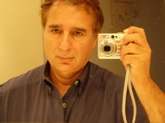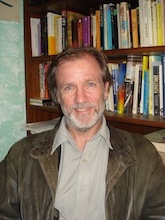David Van Nuys, PhD
See https://shrinkrapradio.com/about/
James Alexander, PhD
Australian psychologist, Dr. James Alexander is author of the 2012 book, The Hidden Psychology of Pain. By way of biographical statement, Dr. Alexander writes: “I became a psychologist after the harrowing experience of being nearly killed in a car accident as an 18 year old, when my VW Kombi van was hit by a drunk in a head on car accident, the van collapsed in on my legs and trapped me in a badly injured state for the next 2 1/2 hours before being freed. In addition to being very physically damaged, I was emotionally traumatized by the experience. When I began to physically recover, I found a collection of pop-psychology self help books in my fathers book shelf, and my psychological recovery began. Within the year, I decided I wanted to become a psychologist so as to help other people that had been similarly traumatized. This was 30 years ago, and for the last 25 years, I have been providing psychological services to a broad range of people in hospital settings, pain management clinics, rehabilitation services, and for the last 10 years, in private practice in NSW, Australia. I have a PhD in clinical health psychology, and because of my interest in mind/body health issues from this, as well as resulting from the chronic pain which I experienced for 18 years following my accident, I have chosen to specialize in the psychological treatment of chronic pain and psychological trauma. Whilst open to a range of approaches, I am these days primarily an EMDR practitioner. Ironically, this approach has opened me up to depth-psychology approaches as well. I am a founding Fellow and current Board member of the Australian Association of Psychologists.”
Check out the following Psychology CE Courses based on listening to Shrink Rap Radio interviews:
Jungian Psychotherapy Part 1 (6 CEUs)
Jungian Psychotherapy Part 2 (7 CEUs)
Jungian Psychotherapy Part 3 (7 CEUs)
Jungian Psychotherapy Part 4 (6 CEUs)
Jungian Psychotherapy Part 5 (7 CEUs)
Jungian Psychotherapy Package of the Five Above (33 CEUs)
Wisdom of The Dream (4 CEUs)
Positive Psychology (6 CEUs)
Pros and Cons of Positive Psychology (5 CEUs)
CERTIFICATE PROGRAM IN POSITIVE PSYCHOLOGY (32 CEUs)
Body-Mind: Goodbye to Dualism (6 CEUs)
Brain: Insights from Neuroscience (8 CEUs)
Meditation & Psychotherapy (8 CEUs)
NEW! Crisis & Trauma: Identification, Assessment, & Treatment (15 CEUs)
Neuroscience and Healing (8 CEUs)
NEW! The Psychology of Relationships (7 CEUs)
Get our iPhone/Android app!
Get 10% discount on all lectures at The JungPlatform using our discount code: DRDAVE
You can also earn CEU’s by going to another partner website at Ed4Online!
A psychology podcast by David Van Nuys, Ph.D.
copyright 2014: David Van Nuys, Ph.D.
Podcast: Play in new window | Download
Subscribe: Apple Podcasts | RSS


Really wonderful interview. Was completely intrigued the entire way through hearing about your journey to becoming Dr. Dave. James did an excellent job facilitating the conversation as well.
Many items to comment on. However, fresh in my mind is the closing admonition on becoming too enthralled to evidence-based techniques. I couldn’t agree more that it hinders innovation. It also cedes too much influence to research psychology which is already overpowered. As I have commented elsewhere, we have become too beholden to research psychology for something that we have clearly been doing well for millennia, that is, helping one another to live. We’re in some Marquezian stupor in which we’ve forgotten how to live without a peer-reviewed study to authorize it.
This leads back to the discussion of education-level and the seeming increase in non-sanctioned techniques and methodologies. In many ways I think this is mostly a good thing. Fundamentally it’s a way for us to wrest control of our psyches from academic institutions which largely do not have fulfillment, meaning, exploration of the cosmos, etc., as their M.O. These are, in some ways, the frontiers of innovation that was decried as stifled by evidence-based practice.
Also, it wages a necessary battle against insurance company/government controlled treatment. I have spoken to many therapists, as I’m sure you have, who simply will not be fenced in by their profit-driven limitations on treatment. In my view this is one of the more important advocacy campaigns in which the profession should be engaged. No one but the therapist and client should be determining the course of treatment and length.
Finally, the proliferation of these non-academic methodologies is perhaps a way to recover the loss of real mentoring, ritual, and a sense of solidarity with each other. The West is so top-heavy and authoritarian it is almost as if we have to go up through the chain of command to reach our fellow human beings any longer.
Positive psychology…oh boy. This is really a poor revival of anything humanistic and should just quietly disappear, particularly its commercialized positive thinking persona. No question we’ve focused too much on pathology and the DSM is literally the Devil’s Dictionary. However, positive psychology is really the same drive, primarily in the West, that seeks to externalize “the bad” whether by having an all good deity, placing the true costs of industry in the environment to maximize profits, or nominating the other side of the world as the Axis of Evil. It really is insidious in that it sets people up for perpetual failure, as they will inevitably confront their pathologies “out there,” as Jung warned, and not recognize them. Fortunately we have had some very intuitive people to remind us that there is no such thing as a crest without a trough, slowly steering us away from this iceberg.
I really hope to hear Dr. Dave Part II in the near future. It seemed you had just covered enough of the past to discuss where you are now before time ran out.
Great interview – an absolutely fascinating rollercoaster through Dr. Dave\’s history and the last part of the interview as a synthesis of where psychology is going was truly insightful. It\’s made me realise that we could do with a few more of these kind of interviews where Dr. Dave gets to have a say. As James said, he only got through a quarter of the questions. I\’d say that another three interviews would be greatly appreciated, and gratefully received – encore!
I thoroughly enjoyed this interview with Dr. Dave and look forward to many more! I loved following the history of psychology over the past few decades and I really appreciated Dr. Dave’s perspective on it all. I seem to see things much the same way as he does. I particularly enjoyed hearing how Dr. Dave developed his career and how he had to use his own judgment, draw his own conclusions and courageously chart his own course. I found it both validating and encouraging. Thanks for a wonderful interview!